A new breath of life?

I recently learnt a Rabindra Sangeet: "Nuton pran dao prano sokha aji ei suprobhate (Bestow me with your divine energy of life, o my eternal friend, today in this auspicious dawn)." After the night of August 5 (Monday), this is the song I am trying to play in my head to stay calm.
I was a part of the crowd in Shahbag on Monday. The euphoria I felt as I was walking along with the sea of people from Shahbag moving towards Gono Bhaban evaporated as soon as I saw the black smoke rising from the ATN News office in Karwan Bazar. My own workplace was also a mess from the vandalism carried out the day before. We had to enter our office by climbing over the gate; the ground floor was a mess of broken glass and potted plants.
As the hours rolled by, the same crowd that had charged me up and made me forget my plantar fasciitis pain, turned into something I had never imagined. What started with the looting of Gono Bhaban, the official residence of the country's prime minister, became more vicious and vindictive by the evening. The architectural pride of our nation built with money from our pockets—the parliament building—was not spared either. On a TV channel, I saw a person holding two documents he found inside parliament and announcing that those would be safer with him.
I wished there was someone to tell the young man that the documents or papers inside the building were not souvenirs, but the state's property. Those documents need to be in place along with other documents, not for the benefit of those who left the country, but for our benefit—we the people, who are here in Bangladesh, the citizens, including him. We don't know if it was a paper about sending relief to the people affected by flash floods in the hills, or some other crucial state matter. Whatever it was, the loss of a single document could mean that somewhere some community in this very country might not get the service they urgently need. I felt such despair watching the video, it felt as if I was watching a horror movie where people were devouring their own flesh.
My despair magnified as more dreadful news started coming in: a colleague got injured, another shot, more TV news channels torched, Awami League leaders' residences attacked, buildings in my neighbourhood torched, and the homes, businesses and houses of worship of minorities vandalised. The nail on the coffin for me was when my friend called and in a frightened voice told me that a mob had entered their building looking for AL leaders. They were vandalising whatever they could find on the ground floor. "Whom should I call?" she asked in a shaky voice.
Whom do we call? I kept on repeating the question in my head, not knowing how to answer her question. On a normal day, I would have suggested she call the police. But where were they? There were reports of attacks on police stations. When the very state agency that is supposed to protect the citizens has completely lost our trust is under attack, whom do we call for protection? Is this what freedom from an autocratic government looks like—a freedom that came about through a mass uprising? Should we allow the tsunami that got rid of the tyrant to drown us now?
My feeling of dread was amplified when I saw clips of the meeting at Bangabhaban on the YouTube channel of a private TV channel to discuss the formation of an interim government. A party that was banned, another that threatened our existence in 2013, and then the one that looted the country 15 years ago sat around the table. Not a single woman was seen anywhere in that room. And to think for more than three decades this country had female leadership!
Thankfully, as I got on social media, I started seeing young people posting emergency numbers, offering voluntary help to protect places of worship or key public infrastructures, and trying to do the work of the law enforcers. I saw videos of young people retrieving and returning most of what was looted out of the parliament building and Gono Bhaban. Even people with opposing political ideologies offered to protect the residences of the AL leaders. Finally, there were the speeches of the coordinators of the Students against Discrimination movement. Those gave me some hope. They emphasised the need for harmony, the need to rebuild an almost broken nation, and the need to come together to protect this country from the grips of yet another corrupt and greedy power.
Though I went to sleep feeling dejected and overwhelmed with the worry of what might come next, the dawn of Baishe Srabon—the death anniversary of Gurudeb Rabindranath Tagore—forced me to hold on to a flicker of hope. Today, when I saw people on the street trying to get back to work and restart their lives after almost four weeks of chaos, killings and curfew, I forced myself to hum "Nuton pran dao prano sokha aji ei suprobhate," earnestly hoping that the night of August 5 would soon become a prachin rojoni (a primitive night) as the song's second line goes: "Prachin rojoni nasho nutono usha lokey (Destroy the primitive night with the heavenly freshness of the new dawn)."
Tamanna Khan is a member of the editorial team at The Daily Star.
Follow The Daily Star Opinion on Facebook for the latest opinions, commentaries and analyses by experts and professionals. To contribute your article or letter to The Daily Star Opinion, see our guidelines for submission.

 For all latest news, follow The Daily Star's Google News channel.
For all latest news, follow The Daily Star's Google News channel. 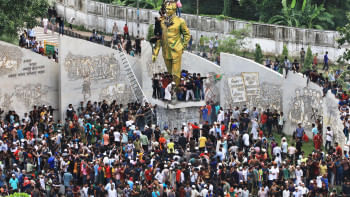
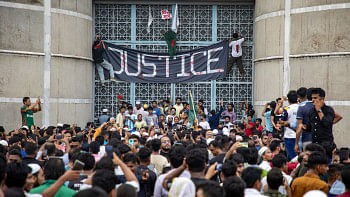


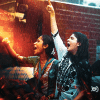

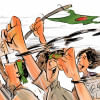

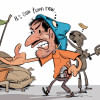


Comments